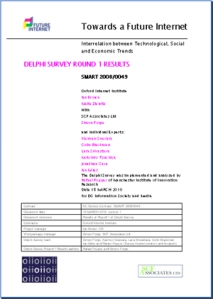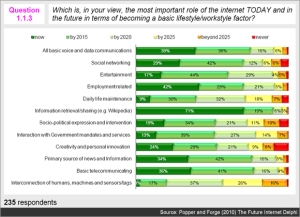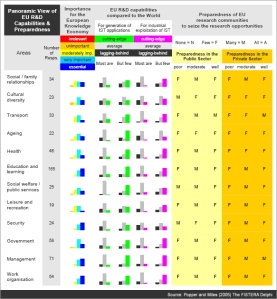Archive
Executive Online Course on Foresight Methods
Course overview: 3 half days | 9 sessions | 9 Hours
- Next date: 23-25 Feb 2021; 1.00pm-4.00pm GMT.
- Delivered by: Dr Rafael Popper and Jouko Myllyoja.
- Teaching: Lectures, practical exercises, case studies.
- Location: Zoom (This is a virtual course).
View the course brochure
We are taking a new methodology and methods-based approach to short executive courses to provide agile and rapid training on common methodologies and methods used in foresight and futures studies. Our method-based approach will be beneficial for anyone interested in designing, implementing, coordinating, managing or evaluating (both ex ante and ex post) processes related to foresight projects or the application of specific foresight methods.
Together with VTT Technical Research Centre of Finland Ltd we are launching a new set of online courses focused on foresight ‘methods’. The course is structured around six lectures and three interactive sessions delivered in a 3-half day programme (including optional individual and group practical exercises).
Course certificate from The University of Manchester will be provided.
You may register for one half day, two half days or the full course. Costs are shown in the brochure. To book your place, please contact the Manchester Institute of Innovation Research (MIOIR) manager Deborah Cox.
Course programme
Half-day 1
Tuesday, 23 February 2021
- Session 1: Foresight Methodology and the Foresight Diamond
- Session 2: How are foresight methods selected?
- Practical: Interactive group session for Q&A and practical discussions
Half-Day 2
Wednesday, 24 February 2021
- Session 3: Cross-Impact and Critical Issues Analysis
- Session 4: Exploratory and Normative Delphi Surveys
- Practical: Interactive group session for Q&A and practical discussions
Half-Day 3
Thursday, 25 February 2021
- Session 5: Scenarios, Wild Cards and Weak Signals Analysis
- Session 6: Robust Advice Framing and Action Roadmapping
- Practical: Interactive group session for Q&A and practical discussions
UAE Space Delphi
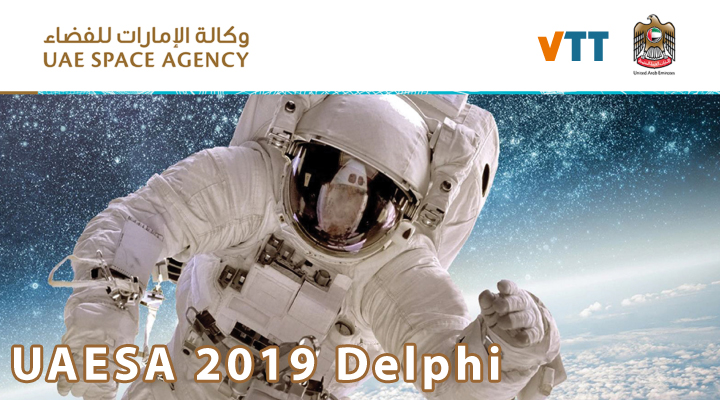
The United Arab Emirates Space Agency (UAESA), in collaboration with VTT Technical Research Centre of Finland, is conducting the UAE Space Foresight exercise supported by two expert workshops (at the 70th International Astronautical Congress (IAC 2019) in Washington DC on October 23rd and at UAESA Headquaters in Abu Dhabi on November 14th), as well as a Delphi survey. The work will be an input for a bigger foresight exercise led by UAESA.
The overall goal of the project is to assess a list of critical technology areas, critical issues, critical actions and sustainable development goals (SDGs) that may be shaping (inter)national policy agendas and roadmaps for future deep space missions, such as the UAE’s plan to establish human settlements on Mars by 2117.
The Delphi survey was closed at the end of 2019 and a White Paper is currently under preparation.
If you have any questions about the project, please contact the UAE Space Foresight project coordinators directly:
Dr. Rafael Popper – Rafael.Popper@vtt.fi
Dr. Khaled Al Hashmi – K.AlHashmi@space.gov.ae
The Future Internet Delphi
Here we present the results of the first round of the Delphi Survey on the Future Internet.
A total of 235 experts took part in the study. These results have been used for main goal of the EU-funded Towards A Future Internet (TAFI) project: the creation of scenarios about a future internet. Two other major sources were also used to form the scenarios as well as the results of this Delphi Survey First Round: (1) Research on the many trends at a socio-economic level that will influence a future internet and also other projects looking at this subject, such as the Stanford ‘Clean Slate’ project; and (2) A major two-day workshop in September 2009 in Brussels with some 20 external experts, which produced strong debate and helped us to reshape our ideas, in some ways completely.
All of this work has been to put together in an initial analysis, an Interim Report, soon to be released, whose core is a set of early scenarios.
In the second round of this Delphi survey we wish to analyse a series of early scenarios, based on the first round’s results plus the extra socio-economic research and the September 2010 Brussels workshop.
So the Second Round presents five scenarios for you to consider and critique. These may seem to be extensions in particular directions but this is to make them identifiably different so that particular characteristics can be clearly seen, although overlaps may exist while combinations of several scenarios may be preferred.
The second round of the Delphi survey and the report are available at:
Towards a Future Internet project website
The FISTERA Delphi
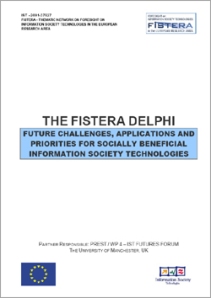 Authors: Rafael Popper and Ian Miles
Authors: Rafael Popper and Ian Miles
Published by: European Commission
Publication date: April 2005
The European Union and its 25 member states, as well as many other governments around the World, are studying carefully the social dimensions of Information Society Technology and its various applications in different areas of social and economic life. Having this in mind, The FISTERA Delphi set out to determine expert views of the following issues:
- What are the main challenges that R&D needs to address in Information Society Technologies (IST)?
- What are the main impediments for developing IST applications?
- What actions should the European Union (EU) implement to achieve more effective and socially beneficial IST development and application?
- How do specific IST Application Areas (e.g. Government, Health, Education, etc.) contribute to specific EU goals (e.g. job and wealth creation, competitiveness, etc.)?
- Which IST Application Areas are liable to contribute most significantly to the success of European knowledge economies?
- What are the EU’s capabilities for generating IST applications and for industrial exploitation of IST?
- How well prepared are public and private research sectors to seize the opportunities presented by developing IST?
- Which stakeholders can contribute most to the development of specific IST Application Areas?
The FISTERA Delphi examined the period to 2010 and beyond. 2010 is the date to which the Lisbon Objectives (i.e. improvement of job & wealth creation; competitiveness; social cohesion & inclusion; and environmental quality in the European Union) are oriented, and is thus an important reference point. But the full implications of many emerging IST applications are unlikely to be fully realised until after that date, and the European Information Society will certainly continue to evolve beyond then.
The study is intended to inform discussions around the future Framework Programme (FP7). It is mainly focused on prospects for the EU25, and many of the experts consulted come from the EU15 and New Member States (NMS); but we also have some participation from experts from other countries. Where appropriate, results are disaggregated by region, so we can compare views of experts from different locations.
Click here to download the report (2.3 MB).

